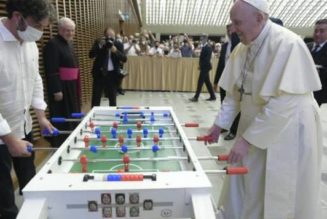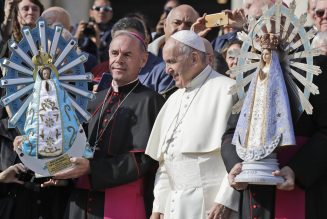KEY WEST, Florida – Over the centuries, the Catholic Church often has led the pack in two distinct specialties: Breaking your heart, and then stitching it back together again with a fresh infusion of hope. This past week brought classic examples of both.
Out of Munich, we got a report from a law firm commissioned by the archdiocese documenting almost 500 cases of clerical sexual abuse stretching over 74 years, including four abusers who served on the watch of the future Pope Benedict XVI when he served as Archbishop of Munich from 1977 to 1982.
Whatever one makes of the report at the level of detail – and there’s already vigorous debate over its assertions about the then-Cardinal Ratzinger – on the whole, it’s another depressing reminder of the way the abuse scandals have laid waste to both the church’s moral credibility and also its internal morale.
Yet beyond Munich, there’s also Mustafa. He’s a 5-year-old from Syria born without limbs due to a developmental problem during pregnancy, apparently caused by his mother’s inhalation of chemical weapons during an attack by government forces during the Syrian Civil War. His father, Munzir al-Nazzal, also lost a leg during the conflict.
A picture by an Italian photographer of the two playing together went viral after winning a photo competition in Siena, and a collection inspired by the photo generated more than $100,000 to fund the prosthetics treatment that both father and son need.
Now the entire family, which also includes two sisters and the mother, Zeibab, has left their refugee camp in Turkey to settle in Siena, a move arranged by a variety of civil organizations led by the Archdiocese of Sienna-Colle and the Catholic charity Caritas, which already had a strong presence in Turkey aiding refugees. The family will live in an apartment provided by Caritas while traveling to the Vigoroso Prosthesis Center, near Bologna, for the necessary medical treatment.
In other words, the al-Nazzal family, which has experienced far more than its fair share of life’s hardships, is getting a new start thanks in large measure to Catholic leadership and energy. If ever there were a story of hope, this has got to be it.
These are the two faces of Catholicism, which may alternately wax and wane, but which are always, inextricably, woven together. To focus on one without the other, to celebrate hope or to condemn heartache in isolation, inevitably fails to tell the whole story.
As for the Munich report, most media attention, naturally, has focused on the section regarding Benedict XVI.
To begin with, it has to be said that given the time frame involved, and the miserable fashion in which the church responded to abuse claims more than 30 years ago, it would be a deep statistical anomaly if there were no cases during the Ratzinger years. In some ways, given the size of the archdiocese, it’s remarkable that only four such cases have surfaced.
Further, it’s also important to stress that of the four Ratzinger cases cited in the almost 2,000-page report, in one instance the authors themselves ended up giving him a clean bill of health because there’s no factual basis for assuming he had any knowledge of the abuse: “Against this background, [the experts] no longer see any reliable basis for continuing to proceed from the knowledge initially assumed and for critically assessing the actions of the then Archbishop Cardinal Ratzinger in this case, as was done in the context of the preliminary assessment. Rather, they see him as exonerated overall.”
The most infamous case of the four involves a priest named Peter Hullerman, who was originally from the Diocese of Essen and who later transferred to Munich. That case was thoroughly examined in 2010, when it first came to light due to reporting by the German newspaper Süddeutsche Zeitung. At that time, the former Vicar General of the archdiocese, Father Gerhard Gruber, took full responsibility for decisions that allowed Hullerman to serve in Munich unimpeded and stressed that he had never discussed the matter with Ratzinger.
We’ll have to see what emerges regarding the other two cases, and whether others now come to light. Given Pope Benedict XVI’s aggressive track record regarding weeding abusers out of the priesthood, including laicizing more than 400 in one year of his pontificate alone, there’s certainly no reason to believe he was ever a knowing co-conspirator in covering up abuse, even if his management during the Munich years suffered from the same deficiencies as the rest of the church at the time.
Haggling over who dropped the ball and who didn’t, of course — however essential to the historical record — can never diminish the awful reality that hundreds of people suffered abuse at the hands of Catholic priests in Munich alone.
As for Mustafa, Caritas in Siena has pledged not only to provide housing, but also to pay for food expenses and pocket money for the family. They’ve also volunteered to help them forge relationships in the city to favor the process of integration in Italy, including learning the language – presumably a far easier task for the young children than mother and father.
(Language school, however, will have to wait until the family has completed Italy’s mandatory COVID quarantine for new arrivals who aren’t fully vaccinated.)
Reportedly, Cardinal Augusto Lojudice of Siena played a key role in working with Italy’s Foreign Ministry to secure the necessary entrance visas for the family, and in overseeing plans for their assistance now that they’re in the country. Coincidentally, the 57-year-old Lojudice currently is considered among the candidates to succeed Cardinal Gualtiero Bassetti of Perugia as president of the Italian bishops’ conference when Bassetti turns 80 in April.
While Mustafa’s future is anyone’s guess, it seems a safe bet it’s more likely to be a happy one today than before the Catholic Church got involved.
That, in a nutshell, is the Catholic story. For anyone paying attention, this past week brought both agony and ecstasy, both pain and pride – much as the Church has done, often on a weekly basis, for the last 2,000 years, and undoubtedly will continue to do until the end.
Follow John Allen on Twitter: @JohnLAllenJr
Join Our Telegram Group : Salvation & Prosperity









